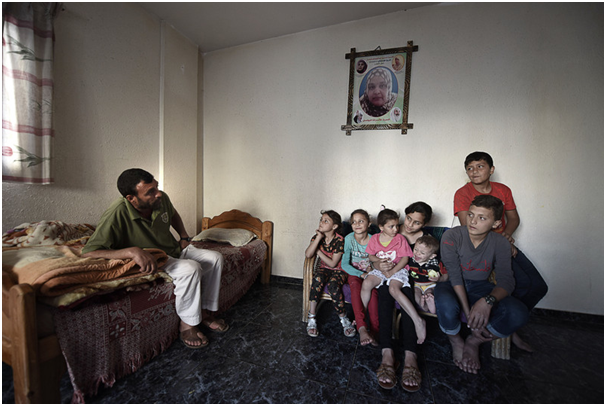Why Has Israel Jailed an Ailing Gaza Mother?

GAZA: The family of Nisreen Hassan is being denied contact with her.
In October last, Hassan was arrested at Erez, the military checkpoint between Gaza and present-day Israel. She has been imprisoned by Israel since then.
Hassan, a 41-year-old Palestinian citizen of Israel, has been diagnosed with lymphoma, according to her family. She had been undergoing chemotherapy in Gaza before her arrest and had responded well to treatment.
Although her family have been assured by Hassan’s lawyer that she is receiving adequate medical care, they are not able to speak with her. The last time Hassan was allowed to phone Hazem Abu Kmail, her husband, was in February.
“She told me that she was fine and sent her love to the kids,” Abu Kmail said.
Hassan has been accused of photographing Israeli military sites in order to benefit Palestinian armed groups.
She has rejected the accusation.
When her case went before an Israeli court in March, she refused to stand before the judge as she insisted that the charge against her is baseless. According to her husband, she has not been involved in politics and had never been previously arrested.
On the day of her arrest, Hassan had been told to visit the Erez crossing by the Israeli authorities. Her understanding was that she was going there because she had applied for Israeli-issued identity and travel documents for her family.
“After one hour, I received a call telling me that my wife had been arrested,” Abu Kmail said.
Erez is one of only two crossings leading in and out of Gaza. The other, in southern Rafah, is the main gateway of Gaza’s 1.8 million residents to the outside world. But it has been closed by Egypt since late October 2014, with only rare exceptions.
Travel via Erez in Gaza’s north is restricted to those with Israeli permits. Most of those allowed are traders and exceptional humanitarian cases, including patients needing medical treatment unavailable in Gaza. The Israeli human rights group Gisha recorded a monthly average of approximately 14,000 exits from Erez last year.
Israel frequently arrests Palestinians attempting to cross Erez.
Israel arrested 44 Palestinians at Erez, including four patients, at Erez last year, according to the Gaza-based human rights group Al-Mezan.
In the first three months of this year, seven Palestinians, including two patients, have been arrested at the checkpoint.
“Israel continues using the policy of extorting and arresting patients and hindering their arrival to hospitals at the appointed time, claiming arresting them for security reasons, which we completely deny,” said Samir al-Zaqout, a researcher with Al-Mezan, who has himself been denied passage at Erez.
Nisreen Hassan was arrested after she was summoned by Israel to appear at the Erez checkpoint — one of only two entrances in and out of Gaza.
Late last year, Israel imposed additional restrictions, limiting the types of illnesses for which Palestinians may seek treatment outside Gaza, and lengthening the security screening for those accompanying patients to their appointments.
Dr. Bassam al-Badri, an official with the Ministry of Health in Gaza, said that delays caused by the additional restrictions “lead hospitals not to accept these patients as they don’t meet their appointments.”
The Israeli human rights group Gisha documented “an increase in the number of permit holders being called in for ‘security interviews’ or interrogations by Israeli officials at Erez” last year.
It was one such summons — which, if declined, can lead to the revocation of a permit — that led to Hassan’s arrest.
Hassan grew up in Haifa, a city in present-day Israel. She had been trying to move her family there from Gaza.
Their hope was that Hazem Abu Kmail would have greater possibilities to find work in Haifa. The family, who live in the Tal al-Hawa neighborhood of Gaza City, have been struggling to make ends meet.
Abu Kmail’s only source of income in Gaza is from his work as a hawker. His daily pay is frequently less than $2.
Hassan is one of 70 Palestinian women now in jail, according to the latest data from Addameer, a rights group. She was detained in Hasharon prison but then moved to Damon, both of which are inside Israel.
“Both of those prisons are overcrowded,” Riyad al-Ashqar, director of the Prisoner Studies Center in Gaza, said.
Hassan’s imprisonment has put a great deal of strain on her family.
Her eldest daughter, 12-year-old Amira, is playing a mother’s role in her absence.
Amira has to clean the family’s home both before and after she goes to school, as well as take care of her 18-month-old brother Ahmad.
Nisreen Hassan’s oldest daughter, Amira, must now assume her mother’s role in caring for the family’s smaller children. Abed Zagout
In total, Hassan has seven children. Her husband works long hours, so the responsibility for many household chores falls on them, particularly Amira.
“I don’t know how to prepare food like mom used to make,” said Amira. “We mostly depend on canned food now. We miss mom’s delicious food.”
As well as taking care of her siblings, Amira regularly attends protests in solidarity with Palestinian prisoners. The protests take place at the Gaza City headquarters of the International Committee of the Red Cross. Amira has been urging the Red Cross to campaign for her mother’s release.
“We miss mom badly in every way,” she said. “I can’t handle things anymore. I want her back with us.”
(Hamza Abu Eltarabesh is a journalist from Gaza.)
( Cover Photo: A poster of Nisreen Hassan hangs in the Gaza City home where she lives with her husband and their seven children. Abed Zagout)
(Electronic Intifada)



